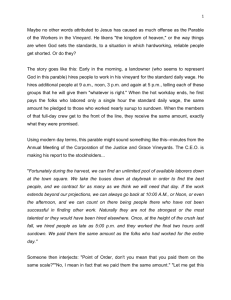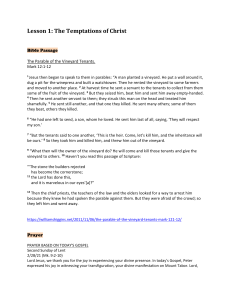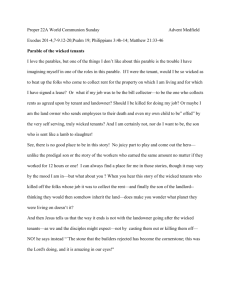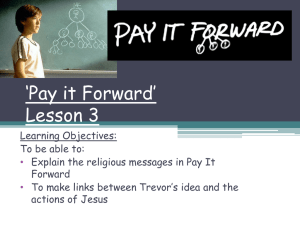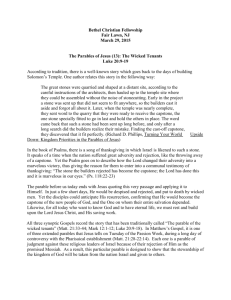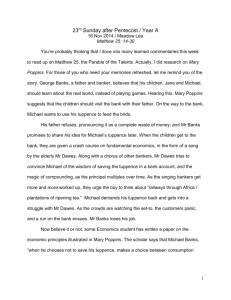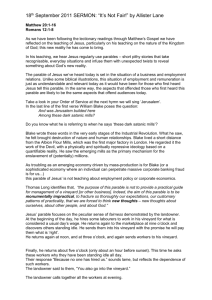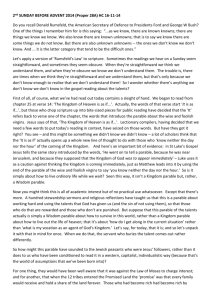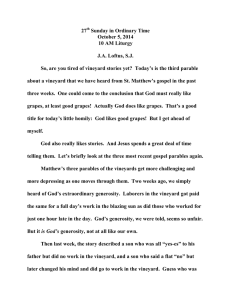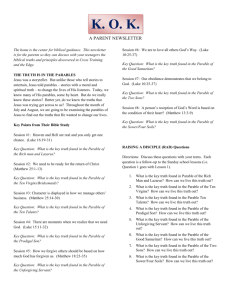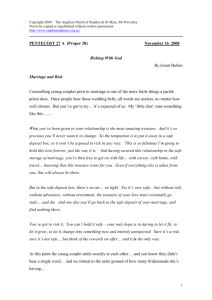Hebrews 12 - Blackburn Cathedral
advertisement
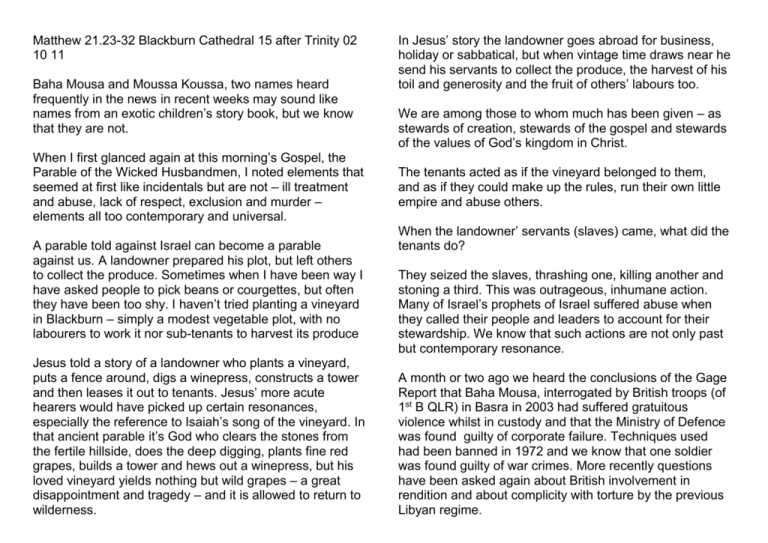
Matthew 21.23-32 Blackburn Cathedral 15 after Trinity 02 10 11 Baha Mousa and Moussa Koussa, two names heard frequently in the news in recent weeks may sound like names from an exotic children’s story book, but we know that they are not. When I first glanced again at this morning’s Gospel, the Parable of the Wicked Husbandmen, I noted elements that seemed at first like incidentals but are not – ill treatment and abuse, lack of respect, exclusion and murder – elements all too contemporary and universal. A parable told against Israel can become a parable against us. A landowner prepared his plot, but left others to collect the produce. Sometimes when I have been way I have asked people to pick beans or courgettes, but often they have been too shy. I haven’t tried planting a vineyard in Blackburn – simply a modest vegetable plot, with no labourers to work it nor sub-tenants to harvest its produce Jesus told a story of a landowner who plants a vineyard, puts a fence around, digs a winepress, constructs a tower and then leases it out to tenants. Jesus’ more acute hearers would have picked up certain resonances, especially the reference to Isaiah’s song of the vineyard. In that ancient parable it’s God who clears the stones from the fertile hillside, does the deep digging, plants fine red grapes, builds a tower and hews out a winepress, but his loved vineyard yields nothing but wild grapes – a great disappointment and tragedy – and it is allowed to return to wilderness. In Jesus’ story the landowner goes abroad for business, holiday or sabbatical, but when vintage time draws near he send his servants to collect the produce, the harvest of his toil and generosity and the fruit of others’ labours too. We are among those to whom much has been given – as stewards of creation, stewards of the gospel and stewards of the values of God’s kingdom in Christ. The tenants acted as if the vineyard belonged to them, and as if they could make up the rules, run their own little empire and abuse others. When the landowner’ servants (slaves) came, what did the tenants do? They seized the slaves, thrashing one, killing another and stoning a third. This was outrageous, inhumane action. Many of Israel’s prophets of Israel suffered abuse when they called their people and leaders to account for their stewardship. We know that such actions are not only past but contemporary resonance. A month or two ago we heard the conclusions of the Gage Report that Baha Mousa, interrogated by British troops (of 1st B QLR) in Basra in 2003 had suffered gratuitous violence whilst in custody and that the Ministry of Defence was found guilty of corporate failure. Techniques used had been banned in 1972 and we know that one soldier was found guilty of war crimes. More recently questions have been asked again about British involvement in rendition and about complicity with torture by the previous Libyan regime. In the parable, in less testing circumstances there is abuse, exclusion and murder. We cannot pick and choose when we treat people with basic humanity. We cannot pick and choose when we uphold international law. We cannot pick and choose when we want to live by the standards of democratic societies. Nor can we cannot pick and choose when we live in accordance with the values of God’s kingdom. So easily there becomes an endless cycle of violence. Baha Mousa was found to have 93 injuries after less than two days in custody. How many others suffered wrongfully at what wasan extremely demanding time for the young soldiers from our communities who staffed our conflicts? In the parable after the gratuitous violence of flogging, stoning and murder, more servants are sent, a larger number, and they are dealt with in the same way. Finally the landowner sends his son, thinking, “They will respect my son.” At times even the word respect is misused, but we are called to respect all people, allowing basic human rights and dignity, as people made in the image of God. My Galloway granny had the gift of seeing something of God in even the most evil of people. However Jesus may have directed his parable to its first hearers, we with Matthew are meant to interpret it christologically, in terms of Christ. We understand the son as Jesus, in the line of the prophets, and Christ comes to us in the other, in neighbour and stranger. Like the tenants, like some leaders of nations and organizations forget their stewardship and operate as if a country, company or even church is a private fiefdom. The tenants want to claim the inheritance, and with twisted logic, they seize the heir, throw him out of the vineyard and kill him. Our Christian tradition focuses on one righteous man, excluded from Israel’s community, crucified outside a city wall, despised and rejected, yet honoured as God’s Son and raised from the captivity of death. The parable is a story to inhabit, meant to provoke its hearers, a story to interpret. In the parable there is judgement. The owner will bring the wicked tenants to a wretched end. They are held responsible for their stewardship of the vineyard and so are we. We are held responsible for our care of the earth, our stewardship of the land, our wealth and inheritance, our gifts and understanding, and as generous custodians of the good news of God’s love. We are also responsible for how we treat others in whatever circumstances, extreme or commonplace, people who are made in God’s image. Jesus asked his hearers whether they knew Ps 118 where a rejected stone becomes the cornerstone of God’s Temple He warns God’s kingdom being given to people who will produce the fruit of right actions and attitude. The authorities took great exception to the preacher, realising that he spoke about them and they wanted to arrest him. Neither the names Baha Mousa and Moussa Koussa come from children’s’ stories nor is the parable simply about Israel’s failure; it is also about our responsibilities and our stewardship of the gospel and of the values of the kingdom of God.
